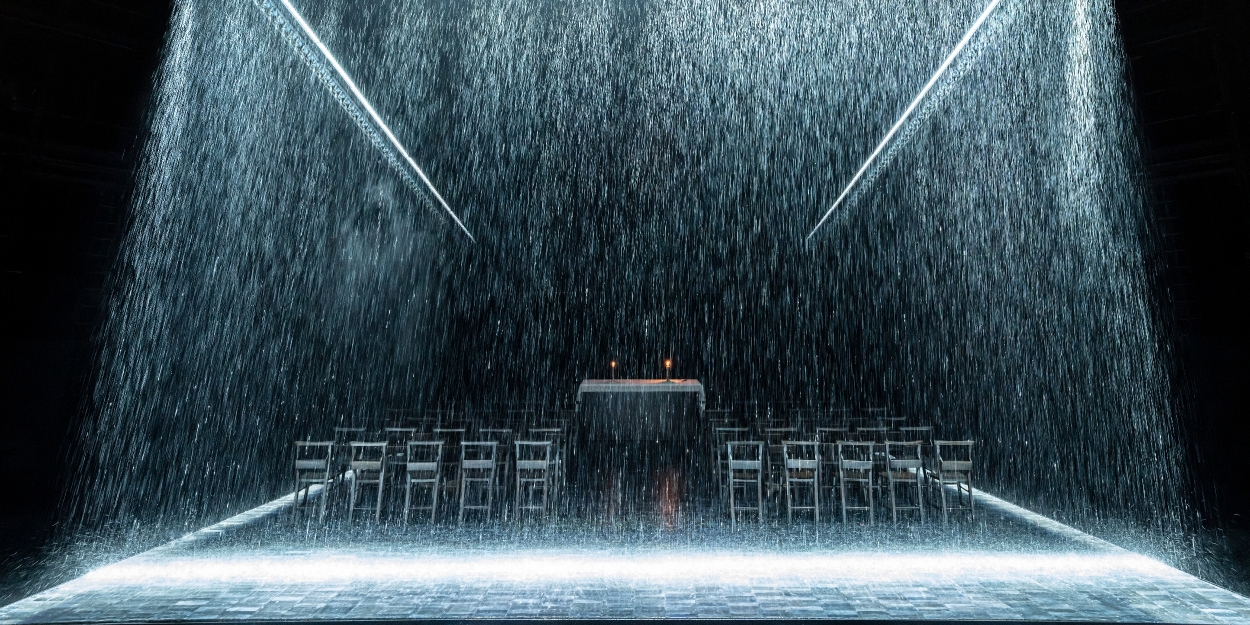Review: THE CRUCIBLE, National Theatre
Director Lyndsey Turner delivers a production brimming with thought-provoking commentary and stunning visuals. Arthur Miller's parable remains frighteningly relevant.

![]()
A controlling, prohibitionist community in New England is riddled with superstition and religious trauma. Mass hysteria kicks off when Betty suddenly and inexplicably falls into a coma and seven babies die in childbirth. In a theocratic society in the late 1600s, the only explanation is witchcraft. As suspicion pushes people to accuse their neighbours, who end up confessing to crimes they didn't commit, John Proctor is the only one who dares to question the system.
Then a direct allegory for McCarthyism, The Crucible now speaks more of the subjugation of theological intellectualism as made famous by popular docu-series, the dangers of a herd mentality, and the power of arbitrary allegations. Lyndsey Turner sets the scene before any of the action begins.
A curtain of water cages rows and rows of bare chapel chairs as they stare blindly at an empty altar. Two candles burn. The sound of incessant rain chatters away. As the pews fill up, the congregation chants and the previously cold white light is overtaken by warmth. Reverend Parris leads, but Abigail's defiance stops the service.
Miller's prologue binds the terms for Turner's universe, which is one of a heavily gendered, cult-y village in the middle of nowhere that looks more like a liminal space than a real place. The big scenes become tableaux vivants. Tim Lutkin's lights shroud the figures and create intense chiaroscuri, which combined with a precise visual structure against the darkness make the play quite Caravaggio-esque in style. It's a spectacular look.
Designer Es Devlin reduces the gargantuan Oliver stage to a smaller square that expands to the back and surrounds it with grey gravel, single-handedly removing it from any context. The clothes don't give much in regard to a specific setting either, with Catherine Fay dipping into ideas from different eras. Men wear 19th-century workwear, but the younger girls are all clad in Laura Ashley-inspired florals with a Peter Pan collar here and there.
It all helps to free the production of any strong link to its creation or original inspiration, turning it into a universal parable. Turner explores exclusion and reputation, judgement and gossip with chaotic ease. It's an impressive company in both size and craft, with 27 actors in total. Abigail and her followers seize up into fits, starting at nothing, spewing hatred and dooming innocent individuals.
Erin Doherty (young Princess Anne in everybody's favourite monarchical series,The Crown) starts as a stooped, scared young woman whose broken, misled passion needs to find an outlet. She is diminished, her hands unravelling from fists into pointed fingers and exaggerated, accusatory gestures. Her Abigail exerts her control over Mary Warren (Rachelle Diedericks) and Mercy Lewis (Anushka Chakravarti) using the same body language as Nick Fletcher's Reverend Parris and the other holy men, starting a common thread for the physical expression of the accusations.
The actor is in direct opposition to John Proctor's wife, played by Eileen Walsh. While the former is bent in her spite but timidly lights up with a shy smile when she first addresses Proctor, Walsh's Elizabeth stands tall and meets her husband on his same level. Cropped hair and a modern eloquence, Walsh offers a strong and clear-headed woman.
They're joined by Brendan Cowell as a strikingly contemporary John Proctor who walks like a cowboy. Cowell introduces a confident, no-nonsense man who's as protective as he is emotional. He shares a delicate chemistry with Walsh, giving their initial big scene the vibe of a remarkable kitchen sink drama. Among the fairly dodgy, peripatetic accents present in the show, his ambles from cinematic north-eastern States to southern and at one point accidentally delves into Italian territory due to the shock of his wife's arrest. The pathos of performance isn't too affected.
Miller's sarcasm and dry wit find fertile ground with Karl Johnson's Giles Corey, who interjects with a bush of white hair and wispy beard, briefly breaking the tension and lightly lifting the mood. Diedricks is definitely another highlight. She gives Mary Warren a gullible sweetness ruled by the fear of being singled out, desperately needing to be part of something.
Almost seven decades after its premiere, The Crucible remains a classic, and this production is brimming with thought-provoking commentary. In a society riddled with fake news, that bends over backwards to regulate a woman's body, justifying its laws with a magical book, The Crucible is frighteningly relevant. Turner's symbolism and exquisite abstraction make this an excellent, faithful transposition of the original material. Plus, it looks simply stunning.
The Crucible runs at The National Theatre until 5 November.
Photo Credit: Johan Persson
Reader Reviews
Videos

